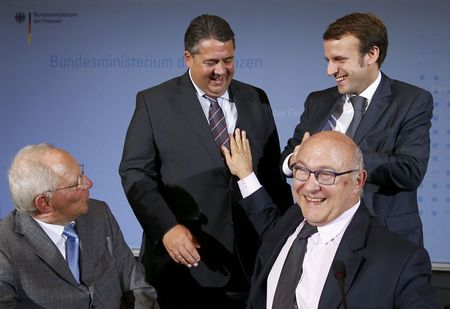By Noah Barkin and Jean-Baptiste Vey
BERLIN (Reuters) - Germany and France sought to paper over deep differences about how to bolster a faltering European economy, promising on Monday to unveil joint proposals on strengthening investment and competitiveness by early December.
They committed themselves to a Dec. 1 deadline but it was not clear the two countries' finance and economics ministers had come any closer on the substance of how to reduce France's budget deficit, reform its labour market or relaunch investment in Germany.
German Finance Minister Wolfgang Schaeuble, who has opposed any big public investment drive, said the euro zone economy was weakening, "so we are determined to do everything together so that we strengthen investment in our countries".
After talks in Berlin, his French counterpart, Michel Sapin, said Paris, which sent a budget to EU authorities last week that breaches its deficit reduction commitments, faced a big challenge to reduce public spending but would tackle the issue.
In a gesture to German fiscal orthodoxy, Sapin said the EU's budget rules were indispensable for the credibility of the 18-nation currency area and France would have to reduce its excessive deficit through spending cuts.
But he made no specific commitment to amend the budget submitted to Brussels, and Schaeuble said it was up to the European Commission to rule whether it was compliant.
"France must make considerable efforts, and we are doing this, to reduce our public spending, to get it under control. But we must do this while preserving investment," Sapin said.
HEALTHY FISCAL POSITION
International partners including the IMF, the European Central Bank, the OECD and the United States have urged Germany to use its healthy fiscal position to invest in rebuilding its roads, railways, broadband and energy networks.
However, Berlin is racing to balance the federal budget next year for the first time since 1969 and has rebuffed calls for credit-fuelled public works programmes.
The Frankfurter Allgemeine Zeitung quoted French Economy Minister Emmanuel Macron as saying Germany should invest an extra 50 billion euros (39.6 billion pounds) on infrastructure over the next three years while France saved 50 billion euros in public spending.
However, Macron told a joint news conference after the talks he had never requested a German investment programme, and it was up to each country to do what it felt appropriate.
German Economy Minister Sigmar Gabriel, a Social Democrat closer to France's governing Socialists than the conservative Schaeuble, said Berlin should raise the share of investment in gross domestic product to 20 percent from 17 percent today. But he rejected short-term public spending projects to achieve this.
Sapin reaffirmed ahead of the Berlin meeting that France would cut its deficit at a rate appropriate to maintaining a fragile recovery.
"We must not go all out for deficit reduction, we have to slow it down because we must be in harmony with the needs of the French economy - we must moreover support growth," he told France Info radio.
The European Commission is due to decide by the end of this month whether to reject the French budget in what would be an unprecedented embarrassment for the core EU member. EU officials say an initial rejection seems likely.
Euro zone leaders will debate the balance between austerity and growth-promoting stimulus measures at a summit in Brussels on Friday.
Macron said at the weekend he was "totally sure" the EU executive would ultimately refrain from that step and voiced hopes that Germany and France would see eye to eye on how to boost euro zone recovery.
France expects growth of just 0.4 percent this year, rising to 1.0 percent in 2015.
Jean Pisani-Ferry, an economist charged by the French government with drafting a joint report with a German peer on reform and investment opportunities, suggested it was time for Berlin to "re-consider its priorities".
"Germany is still living on the laurels of the (Gerhard) Schroeder period," he said of the centre-left ex-chancellor who radically overhauled Germany's labour market in the 2000s.
"In Germany, apart from the minimum wage, there have been very few reforms of major import in the past few years," he told Les Echos newspaper.

(Additional reporting by Mark John in Paris; writing by Paul Taylor; Editing by Anna Willard)
_800x533_L_1412520412.jpg)